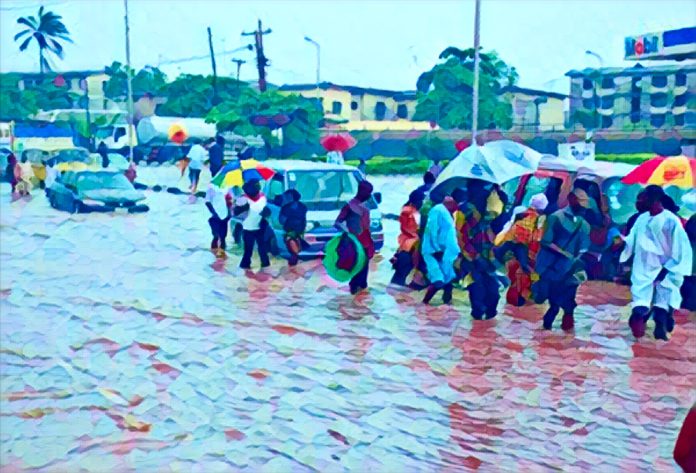KEY POINTS
-
Rain amplifies Lagos’ reliance on informal economies, from darkness-driven side hustles to opportunistic street vending.
-
Floodwaters create temporary fisheries and mobility crises, blending environmental risks with unintended community bonding.
-
Despite increased malaria threats, cultural and economic factors hinder preventive measures, underscoring gaps in public health strategy.
When the first drops of rain hit Lagos’ bustling Oshodi market, 34-year-old street vendor Chidinma Nwosu doesn’t just pack up her goods—she transforms into a makeshift meteorologist. “Rain here isn’t just water; it’s a signal,” she says, swiftly swapping her usual inventory of phone chargers for umbrellas priced at triple their dry-day rate.
While weather reports warn of thunderstorms and flooding, Lagosians navigate a cascade of unspoken rituals and consequences each time the skies open.
From spontaneous entrepreneurship to submerged power transformers, the city’s rhythm bends to rain in ways no app can predict. “You haven’t seen Lagos until you’ve seen it dance between chaos and ingenuity under rain,” laughs Danjuma Adeyemi, a danfo driver who’s mastered alternate routes through knee-deep floods.
From blackouts to bonding: The hidden social currents of Lagos rain
1. The Generator Economy Goes Silent:
Rain-induced power outages plunge neighborhoods into darkness, but not quiet. In Mushin, tailor Emeka Okafor recounts: “My sewing machine stops, so I become a ‘darkness barber’—cutting hair by phone flashlight.” The National Grid Corporation notes a 40% spike in outages during rains, yet few report it: over 60% of Lagosians rely on generators anyway.
2. Fish Take Over the Roads:
Flooded streets in Ajegunle become accidental fisheries. “Children catch tilapia with baskets near drainages,” says environmentalist Tolu Adekunle. Nutrient-rich runoff from the Ogun River mixes with urban debris, creating temporary ecosystems. Sadly, these fish often carry toxins from polluted waters, unwittingly sold at local markets.
3. Traffic as Theater:
Go-slow (traffic jams) morph into communal spaces. Hawkers sell roasted corn; stranded executives share cars. *“I met my business partner in a 4-hour gridlock on Third Mainland Bridge,”* shares tech entrepreneur Femi Balogun. A 2023 LBS study found 1 in 5 Lagosians forged significant personal or professional connections during rain delays.
4. Mosquito Metropolis:
Post-rain, stagnant water fuels a mosquito boom. At Alimosho General Hospital, nurse Grace Okoro sees a 70% rise in malaria cases. “We call it ‘July soldiers’—the mosquitoes arrive like an army,” she says. Despite this, fewer than 20% of households use nets, per state health data, due to heat and distrust of “foreign” prevention methods.
5. The Rise of ‘Rainpreneurs’:
Entrepreneurs like Nwosu capitalize on sudden demand. From waterproof phone pouches (₦500) to “dry feet” plastic bag shoe covers (₦200), informal markets pivot instantly. “Rain is my Black Friday,” grins 19-year-old vendor Yusuf Bello, who sells “emergency” ponchos from China.



